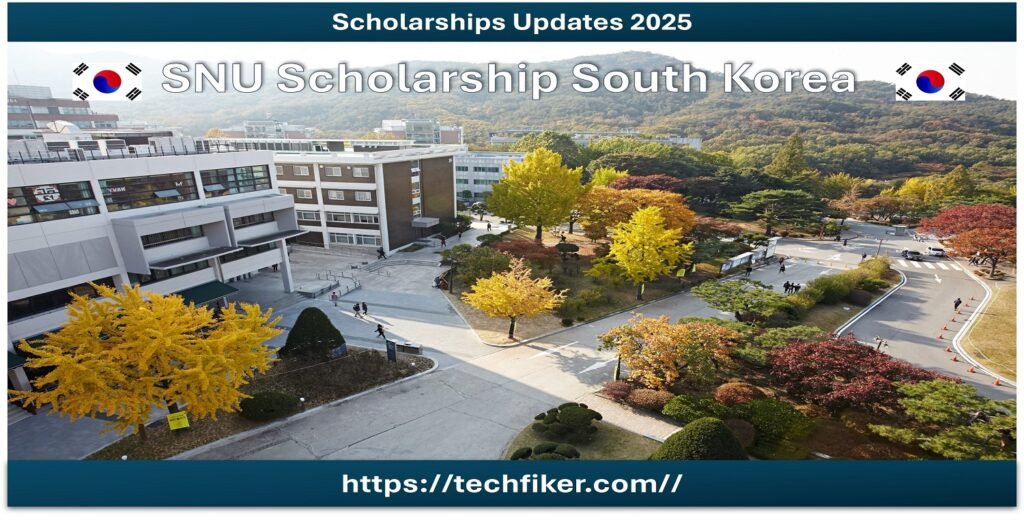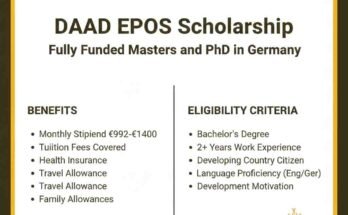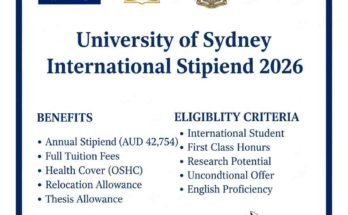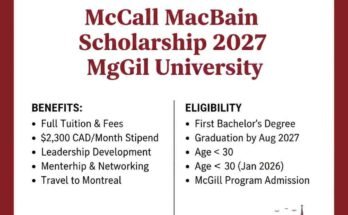One notable opportunity is the Graduate Scholarship for Excellent Foreign Students (GSFS), offered by Seoul National University (SNU), widely regarded as South Korea’s top university.
This blog serves as a detailed guide for international applicants interested in the GSFS, covering everything from eligibility requirements and scholarship benefits to the application process, important deadlines, and practical tips to boost your chances of success.
| Host Country | South Korea |
| Host Institute | Seoul National University |
| Level | Graduate |
| Eligible Nationality | International |
| Fellowship Type | Fully Funded |
| Closing Date | Fall Intake: Feb, March Spring Intake: July, Aug |
Seoul National University (SNU): A Brief Profile
Established in 1946, Seoul National University (SNU) is recognized as South Korea’s premier institution of higher learning. Renowned for its academic excellence, cutting-edge research, and global outlook, SNU consistently ranks among the top universities in Asia and worldwide. The university offers more than 300 graduate programs across 16 colleges and 10 professional schools, making it a hub for innovation and international collaboration.
Appreciating the importance of diversity, SNU actively attracts exceptional students from around the world through programs such as the GSFS.

An Introduction to the GSFS
The Graduate Scholarship for Excellent Foreign Students (GSFS) is a fully funded award designed for outstanding international students seeking to pursue graduate studies at Seoul National University (SNU).
This scholarship specifically targets applicants from selected countries in East, Southeast, and Central Asia, with the goal of fostering international collaboration and nurturing global talent across a wide range of academic fields.
Aims of the GSFS
- Foster international academic collaboration by supporting gifted students from emerging countries.
- Enhance SNU’s global reputation by attracting promising researchers and scholars.
- Offer financial support to exceptional students, allowing them to fully dedicate themselves to their studies and research.
Eligibility Guidelines for GSFS
To be eligible for the GSFS, you must fulfill all of the following requirements:
Nationality
- Applicants must be non-Korean citizens.
- Candidates should have completed, or be on track to complete, their undergraduate degree (for Master’s applicants) or Master’s degree (for Ph.D. applicants) outside of Korea.
Academic Background
- Applicants must have graduated from a university based in East, Southeast, or Central Asia.
- A strong academic record from an accredited institution is required.
Admissions Requirements
- Applicants must apply and be admitted to a graduate degree program (Master’s, Doctoral, or Integrated) at SNU.
- Candidates must apply to a department that participates in the GSFS program (please note that not all departments are included).
Language Proficiency
- Proof of English proficiency (TOEFL, IELTS) or Korean proficiency (TOPIK) is required by most departments.
GSFS Scholarship Advantages
Here’s a rewritten version:
“The GSFS offers a full financial support package, which includes:”
| 🧾Tuition Fee Waiver | 100% coverage for up to 4 semesters |
| 💰 Monthly Living Stipend | Amount varies by department (approx. KRW 500,000 – 900,000) |
| 🏥 Health Insurance | Coverage under Korea’s National Health Insurance |
| ✈️ Airfare Support | Provided by some departments (not guaranteed university-wide) |
| 🏠 Housing Assistance | On-campus dormitory accommodation may be available |
1. GSFS Application Procedure
Here’s a rewritten version:
“Applying for the GSFS does not require a separate application form, as it is part of SNU’s graduate admissions process. Please follow these steps carefully:”
Here’s a rewritten version:
2. Submit Your Application for Graduate Admission to SNU
- Complete the online application via the SNU Admissions Portal.
- Upload all required documents, including:
- Academic transcripts and degree certificates
- Statement of Purpose (SOP)
- Study plan and research proposal
- Two letters of recommendation
- Proof of language proficiency (English or Korean)
- A copy of your passport
- Any additional documents required by the specific department
3. Express Interest in GSFS
In your application, specify that you are applying for the GSFS.
No additional form or fee is required.
4. Departmental Evaluation and Interview
Shortlisted candidates may be invited for an interview or asked to complete additional evaluations.
5. Final Decision
Departments put forward their most outstanding applicants for consideration.
The Office of International Affairs (OIA) at SNU is responsible for making the final selection and issuing award notifications.
Typical GSFS Application Timeline
| Fall Intake | February March |
| Spring Intake | July, August |
Approved Fields of Study
The GSFS scholarship is offered across various academic disciplines, depending on departmental involvement. Common fields include:
- Engineering (Mechanical, Electrical, Civil, Chemical)
- Natural Sciences (Physics, Chemistry, Biology)
- Social Sciences (Sociology, Political Science, Economics)
- Humanities (History, Literature, Philosophy)
- Business Administration
- Education
- Agricultural and Life Sciences
- Environmental Science
- Computer Science and Artificial Intelligence
Tips for a Successful Application
Here are several ways to enhance your chances of receiving the GSFS:
1. Develop a compelling Statement of Purpose (SOP) and Research Proposal.
Clearly outline:
- The reasons you’re applying to SNU.
- Your long-term academic and career objectives.
- How your research aligns with the goals of your chosen department.
2,Obtain Strong Letters of Recommendation.
Choose academic referees who:
- Are familiar with you and your work.
- Can attest to your research potential and academic capabilities.
3. Emphasize Extracurricular Activities and Leadership Experience.
Provide evidence of community service, research assistantships, internships, or other leadership positions.
4. Fulfill Language Requirements.
Submit valid scores well in advance of the deadlines:
- TOEFL iBT: Typically 80 or higher
- IELTS: 6.0 or higher
- TOPIK: Level 3 or higher (for Korean-language programs).
5. Adhere to Formatting Guidelines.
Follow document formatting and submission instructions carefully.
Commonly Asked Questions (FAQs)
Am I eligible to apply if I graduated from outside Asia?
No, the GSFS is only available to applicants who obtained their previous degree in East, Southeast, or Central Asia.
Is it possible to apply for other scholarships in addition to the GSFS?
Yes, you can apply for other scholarships, but the GSFS cannot be combined with other full scholarships.
Is proficiency in Korean required?
Not necessarily. While many programs are available in English, knowing Korean can be beneficial for daily life and may be required in certain departments.
What happens if I don’t meet the GPA requirement?
Your scholarship may be revoked if your GPA drops below 3.0 or if your academic progress is deemed unsatisfactory.
Am I allowed to work while studying?
International students are allowed to work part-time, subject to visa conditions, though work hours are restricted. It’s important to prioritize your academic responsibilities.
Helpful Resources and Links
Final Thoughts
The Graduate Scholarship for Excellent Foreign Students (GSFS) offers more than just financial support—it’s an opportunity to study at one of Asia’s leading universities, connect with an extensive research network, and experience the dynamic culture and innovation of South Korea.
If you’re a high-achieving student from Asia with plans to pursue graduate studies abroad, seize the opportunity to apply for GSFS. Prepare your application carefully, showcase your potential, and take the first step toward an exceptional academic journey at Seoul National University.
You may view other Scholarships as well
Aichi Scholarship in Japan


